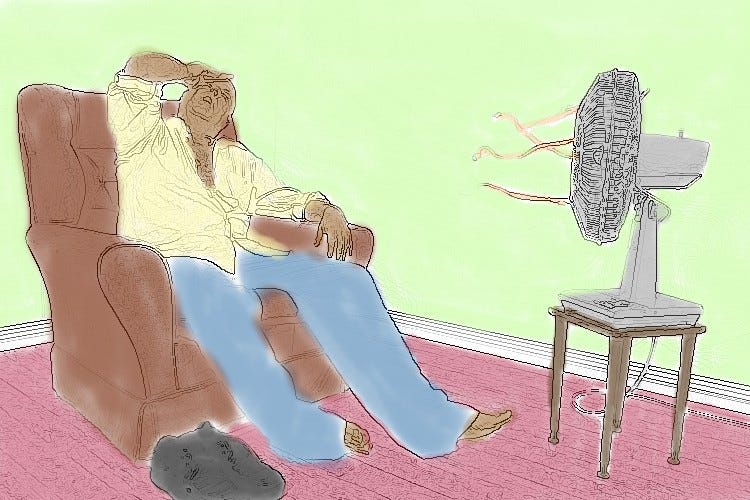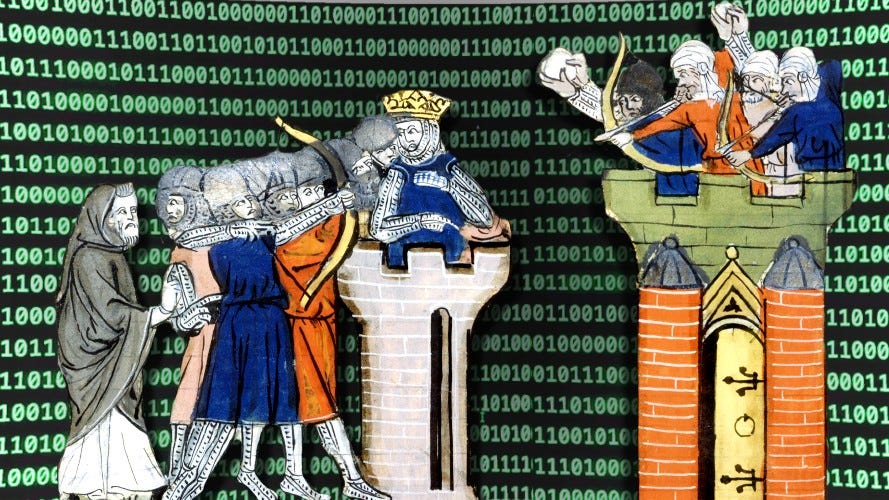Climate Change Is Not About Convincing People to Sweat Their Balls Off
A green future is compatible with comfy testes

On Saturday, the New York Times ran an op-ed called “I Swore Off Air-Conditioning, and You Can, Too”. The author is a guy who — as far as I can tell — has no knowledge or qualifications other than being willing to live in Kansas without air conditioning, which does seem like a David Blaine stunt that even David Blaine was too chicken to try. The author’s depiction of his ascetic lifestyle doesn’t sound appealing — he writes:
We also kept other appliances and devices turned off as much as possible because they, too, generate heat. Dishwashers are double trouble, putting out heat and humidity. We don’t have one.
You can’t unplug the refrigerator, of course, but we keep ours set for just under 40 degrees, the highest safe temperature, according to the Food and Drug Administration. And we dry our laundry on the clothesline out back.
When it gets too hot, we lightly spray water on our arms, legs and faces; the water helps dissipate a lot of heat. A quick, cold shower or a little time spent with that all-American favorite, the lawn sprinkler, also can bring relief.
I’m sincere when I say that I support this guy’s right to live his Amish-without-the-free-barns lifestyle. If he wants to spend every summer getting doused with more water than a ‘90s R&B star in a music video, he can go right ahead. But for the record: Climate change does not require that you bring a lawn sprinkler into the living room to avoid death by Swamp Ass. We’re going to solve climate change by advancing new technology, not by promoting a pious austerity that makes Puritanism look like a Caligulan orgy.
One of my early bosses at EPA really liked the phrase “culture of environmentalism”. I wrote a lot of speeches about how we could foster a culture of environmentalism that would encourage people to do things like drive smaller cars and use energy efficient light bulbs. What a bunch of bullshit that was — we did not succeed in convincing significant numbers of people to lead different lives. And I don’t think that we were particularly close; I don’t think that if we had just handed out a few more Garbage Gremlin t-shirts on Earth Day, then today we’d all be driving cars that run on carrot juice.
Change did happen, though. Notably, LED light bulbs became such a good technology that only the world’s biggest idiot would prefer the old bulbs (and, indeed, he does). Electric and hybrid cars became sorta-competitive with regular ones, and Americans continue to buy low-emission cars when gas prices are high. Change came, but it came in the form of altered markets and better technology, not in the form of some Age of Aquarius bullshit where Americans were suddenly inspired to weave their own houses out of hemp.
Green technology is advancing rapidly. Some of the most exciting advances involve batteries, which can greatly advance green energy and transportation, which are the two biggest slices of the greenhouse emissions pie. Congress has removed barriers to nuclear power and made a huge investment in green tech, which is one reason why investment in clean technology and infrastructure has almost doubled in only two years. I remember the “what should we do?” era of our climate dialogue, and I consider that era over: We’ve made a decision, we have a plan that can work, the relevant debates are now about how to advance new technology as quickly as possible.
Trying to convince people to abandon modernity won’t work. It hasn’t worked in the US, and it won’t work in the developing world, where people want to enjoy the fruits of prosperity instead of being told “ooo, you just missed the window”. Discipline and self-denial are always hard sells; that’s why we have very few Mennonites but tons of sugar-loaded “coffee” drinks that are basically a single espresso bean floating in a barrel full of whipped cream. Messaging around green technology involves words like “future”, “next-gen”, and “jobs”, while messaging around degrowth involves words like “avoid”, “withstand”, and “twice-hourly crotch spritz”. Converts to this religion will be few.
We’ve probably also reached the point at which encouraging people to sacrifice has stopped being merely futile and is now actively harmful. Normies have noticed that the climate movement includes more than a few Netflix-documentary-quality zealots. Your fringier climate protesters — the people gluing themselves to artwork and dreaming up new ways to be galactic assholes — are widely recognized as doomsday cultists. People believe that these people’s activism is less about solving a serious problem and more about condemning the wicked ways of capitalism/the Global North/insert activist buzzword here. The asceticism that was already a hard sell 20 years ago has become associated with a cult of anti-social fanaticism, and it’s about as popular as empanadas filled with dog shit.
The Times op-ed was far from the worst I’ve read. The author didn’t chastise air conditioner users for our wicked ways — he just said “here’s what I choose to do”. Alas, his argument wasn’t compelling, unless you find the idea of waking up in an ocean of your own sweat compelling. Personally, I’ve given up on trying to convince people to forego things like air conditioning and am focused on getting air conditioners hooked up to a clean energy grid. And I invite the author of the Times op-ed to join me in modernity.







This has been one of the major debates within environmental/decarbonization circles for decades (where I’ve spent my career; now in nuclear power)
These two schools of thought have many names but I like “Dark Green” and “Bright Green”. Where “dark green” is the idea of living smaller, more constrained lives to solve the problem, and “bright green” is the idea the technology will get us out of it. In its extreme, it’s sometimes called “ecomodernism”, where energy use is “decoupled” from environmental impact. And thus one of the most popular nuclear power podcasts is called “Decouple”.
Obviously, the bright green future is the more appealing one, and far easier to sell politically, as Jeff points out here.
In reality, I think it is going to take a little bit of both if we’re to get there and avoid the worst impacts of climate change.
That said, my observation is that as soon as people realize that climate policies will have even the *smallest* impact on their consumer choices of way of life, they immediately punish the politicians that promulgate dark green policies. So you have things like in the US, Biden going basically only for bright green policies (dropping even modest Obama-era dark green policies like low-water appliances). And here in Canada, where our current (Trudeau) federal government went much heavier on dark green policies — well, just look at the polls. They’re at like late-Carter levels.
So I think the result is that we’re going to get the bright green policies only. Long run I do think technology will save us, but things are going to get pretty bad before 2050. Continued rampup of heat, extreme-weather events, global climate migration. Not the end of the world, but it will get bad. I also think that “geoengineering” (sulphur seeding in the atmosphere to cool temperatures etc.) is pretty quickly going to go from unthinkable to, the base plan.
Yglesias has written about this too, also urging Dems to drop all the Dark Green stuff. Politically it makes sense!
I was more intrigued that this guy who wrote an anti aircon book 14 years ago managed to use that hook to get a NYT oped now!
(and his whole "we wash up by hand, we hang the laundry outside" - I'm reading a lot of "my wife" into that WE).